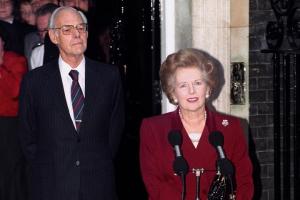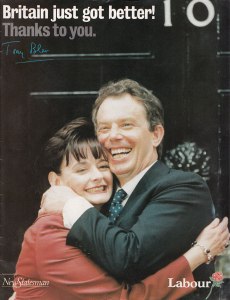Dear ‘Yes’ voters,
I see a lot of very heartbroken messages on social media as people wake up to the news that Scotland have voted ‘No’. I have read a lot of people talking of how our opportunity has now gone, how they are done with Scotland, threats of moving away from Scotland and just general disillusion. So here is a wee message to you all.
When I was a bairn one of my first memories that I can still see in my head as clear as yesterday, was Margaret Thatcher leaving 10 Downing Street. This wasn’t my first exposure to politics, but it’s an event that remains with me. I must have been about 5 or 6. I remember candidates that were being put forward to take over from Thatcher too. The UK was still very much Conservative! I remember the Poll Tax. It obviously wasn’t something I ever had to pay, but I do recall the resentment. It wasn’t until I was in high school that Labour had that massive landslide victory!!!
My first protests I went to happened during the Tory years. It was a protest against cuts to education. I remember someone had made a massive puppet of Michael Forsyth with a scythe and the slogan ‘Michael Forscythe’! I think if I could go back I’d also have pointed out that ‘Forsyth’ could be changed to ‘Forsith’ and get some Star Wars reference in there, just because I love Star Wars and, well, it’s kinda funny!
I remember staying up the night of the Labour landslide victory in 1997. Even then, I never thought I would see any real power in Scotland! When Norway is almost as far away as Westminster you do wonder sometimes why Scotland’s future is in the hands of politicians so far removed from the people themselves. It wasn’t long after that Scotland was given the new powers of a devolved parliament (though it did take a while to get that ugly building at Holyrood built and it cost a bloody fortune. Same old Edinburgh!).
When the UK looked like it was heading towards war with Afghanistan, I was on the streets protesting against it. It attracted a fair number of people in Scotland who were not happy about going to war. However, it was the protests against going to war with Iraq that remains with me. “The biggest anti-war movement in the UK since Vietnam” they said and we never went to war in Vietnam. This time it was different.
I went to anti-war protests in Glasgow AND Edinburgh. The number of people on the street was mindblowing! I made some awesome banners against the war which I stuck in my window after I came back from the protests. The energy was amazing! I walked alongside Tommy Sheridan at one point and felt like this anti-war movement wasn’t just kids that knew no better, but we were walking with people from all different backgrounds. I even bumped into an old school teacher I had! Schools were out in force, especially my old high school. The young people of 16 and 17 years old joining in this HUGE movement of people.
The UK went to war. The people I had walked beside on the streets were ignored.
I remember being bitterly disappointed. In fact, I remember being very angry at the government for not listening to the people. I saw a huge movement of people slowly come to terms with the fact that their voices that had been raised so loudly, not only in Scotland, but across the UK, suddenly realise that Westminster weren’t listening. I saw the first bombs being dropped in Iraq. I watched it on TV and I wept. We knew it would happen that night. Next day I was back out on the streets protesting. And I kept protesting until the protests stopped and the people went silent.
The people had been right. There were no weapons of mass destruction. The UK had gone into an illegal war. The ‘I told you so’ attitudes still resonate as an even scarier looking force in the form of ISIS or IS or ISL or whatever the hell you want to call them start to eye up the vacuum left in the Middle East. The West now terrified of making another mistake! Saddam was a monster, there’s no denying that. But that is a different argument for a different day.
Why am I discussing the Iraq War? The protests. The masses of people who got up and made their voices heard. The banners, the slogans are all a memory. When the elections came around Labour were punished in the ballot boxes both in the General Election and the Scottish Election. The momentum of dissatisfaction continued and still resonates as we have a coalition government sat in Westminster. It still resonates around Westminster as they ponder whether to join in on wars in Syria or against ISIS.
The miners strikes, the Poll Tax, the Afghanistan war, the Iraq war… There are movements of people who stand up against the way government is run and not all of them are listened to. I find it interesting how many things from Thatcher’s era are slowly seeping out now like the cover up at Hillsborough. Again this is another discussion for another day.
After all my rambling, I’ll get to the point. 1,617,989 people who voted yesterday (that’s 45% of the total number of people who voted) voted ‘Yes’! That is a HUGE deal! It’s not half, but it’s a lot better than what many expected 18 months ago. The reaction of the leaders of the three big UK parties in the last week shows that they were scared of losing this. And this with only one newspaper backing the ‘Yes’ campaign. The sheer number of people engaged in politics has been AMAZING! I’ve never seen a debate quite like it! In an era where people are apparently disillusioned with politics, the percentage of people even turning up (over 80%!) was astonishing!
Ok, so the vote was ‘No’, but the people that I’ve seen saying they were going to vote ‘Yes’ have been represented on the whole by young people. And I don’t mean just the 16 and 17 year olds that were allowed to vote, I mean university and college students, people in their 20s! Rather than falling into despair I really think that we should look at this in a positive light. This was the people speaking, not the media. If young people can continue their enthusiasm for politics, then Scotland as a society have won! We have a General Election coming up next year, make sure you are registered and make your vote count! Don’t become apathetic, don’t give up hope. This is the beginning and we can move forward from this.
There were arguments that people found that the ‘Yes’ side weren’t answering properly. Lets now take time to look at these questions again and look for ways that they could be addressed if we were able to take this opportunity again in 5, 10 or 15 years time. Play the long game rather than becoming ‘woe is me’. We got this far, lets keep the momentum going!
Last night’s achievement was incredible. We must accept defeat graciously, but celebrate our achievements. Stay passionate, stay political, keep raising your voices, keep pushing for a better Scotland. We may not be independent, but we are still a great nation and we can still move things forward in a positive manner!




